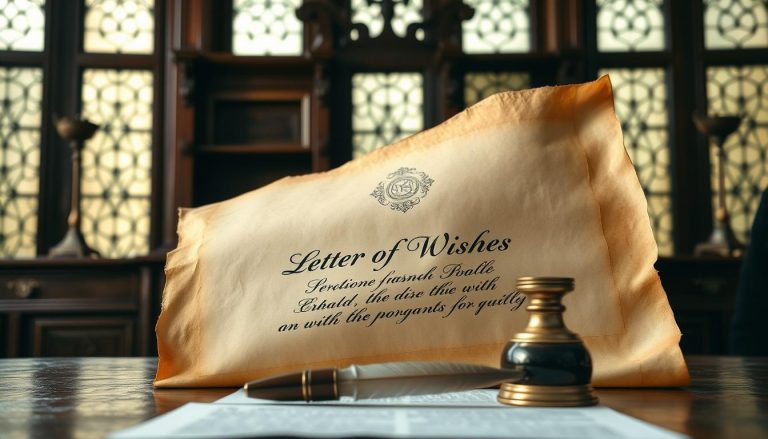Crafting a meaningful letter of wishes is an essential aspect of estate planning in the UK. It allows individuals to express their wishes regarding the distribution of their assets, funeral arrangements, and other personal matters after they pass away.
Although not legally binding, this document serves as a guide for executors and beneficiaries, providing clarity and comfort during a difficult time. We understand the importance of creating a document that truly reflects your intentions and supports your loved ones.
By including your testamentary wishes in a clear and comprehensive manner, you can ensure that your estate is managed according to your desires. We are here to guide you through this process, making it as straightforward and stress-free as possible.
Key Takeaways
- Understand the role of a letter of wishes in estate planning.
- Learn how to express your wishes clearly and effectively.
- Discover the benefits of having a comprehensive estate plan.
- Find out how to ensure your estate is distributed according to your desires.
- Get guidance on creating a document that supports your loved ones.
Understanding Letters of Wishes in the UK
For those navigating the complexities of estate planning, a letter of wishes can be a vital tool, offering clarity and direction to executors and beneficiaries alike. In the UK, this document plays a significant role in communicating an individual’s intentions regarding their estate, family, and personal matters.
What is a Letter of Wishes?
A letter of wishes is a non-legally binding document that provides insight into an individual’s desires and expectations for the distribution of their assets, the care of their loved ones, and other personal matters after they pass away. It is often used in conjunction with a will, serving as a guide for executors and trustees.
As noted by Assured Private Wealth, “a letter of wishes is not a legally binding document, but it provides valuable insight into the individual’s intentions.” This characteristic makes it a flexible and personal way to convey one’s wishes without the formalities required by a will.
Importance of Letters of Wishes
The importance of a letter of wishes lies in its ability to provide clear guidance to those left behind. It can cover a wide range of topics, from the distribution of personal effects to the expression of wishes regarding funeral arrangements. Here are some key reasons why a letter of wishes is important:
- Provides clarity on personal and family matters
- Guides executors in making decisions that align with the deceased’s intentions
- Can help reduce potential conflicts among beneficiaries
- Offers a personal touch, allowing the individual to express their values and wishes
Legal Standing of Letters of Wishes
While a letter of wishes is not legally binding, it is still a crucial document in the context of estate planning. Executors and trustees are expected to consider the wishes expressed in the letter, although they are not obligated to follow them if they conflict with the law or the instructions given in the will.
It’s essential to understand that the legal standing of a letter of wishes is advisory rather than mandatory. Therefore, it’s crucial to ensure that the letter is consistent with the will and other legal documents to avoid any potential conflicts.
The Purpose of a Letter of Wishes
A well-crafted letter of wishes can provide clarity and guidance for those left behind, ensuring that an individual’s estate is managed according to their desires. This document serves as a personal and compassionate way to communicate one’s intentions regarding various aspects of their estate.

Personal and Family Matters
A letter of wishes can address personal and family matters that are not typically covered in a will. For instance, it can include personal messages to loved ones, funeral wishes, or specific requests regarding the distribution of personal effects. This aspect is particularly important as it allows individuals to express their feelings and wishes in a more personal manner.
Financial and Asset Distribution
When it comes to financial and asset distribution, a letter of wishes can provide detailed instructions to executors and trustees. This can include guidance on how to distribute assets, such as property, investments, or other possessions, in a way that aligns with the individual’s intentions. For more information on how to effectively use a letter of wishes in estate planning, you can visit Park Lane Plowden’s resource on the topic.
Guardianship of Children
For families with minor children, a letter of wishes can be particularly valuable in expressing preferences regarding guardianship. Parents can outline their wishes for the care and upbringing of their children, including educational preferences and other important decisions. This can provide comfort and guidance to those who will be responsible for the children’s welfare.
In summary, a letter of wishes is a versatile document that can cover a range of important matters, from personal messages to financial instructions and guardianship preferences. By including these elements, individuals can ensure that their estate is managed in a way that reflects their values and wishes.
How to Write a Letter of Wishes
To create an effective letter of wishes, you must consider your personal, financial, and familial circumstances. This document serves as a guide for your executors and loved ones, providing them with the clarity they need to carry out your wishes.

Step-by-Step Guidance
Writing a letter of wishes involves several key steps. First, you should start by outlining your personal and family matters, including any specific requests or wishes you have regarding your estate.
- Identify your assets and how you wish them to be distributed.
- Consider any charitable donations you wish to make.
- Outline your wishes regarding the guardianship of children or pets.
By following these steps, you can ensure that your letter of wishes is comprehensive and clear.
Choosing the Right Tone and Language
The tone and language used in your letter of wishes should be warm and personal, yet clear and concise. It’s essential to avoid ambiguity and ensure that your wishes are easily understood.
We recommend using simple, everyday language to convey your wishes. This will help prevent any confusion and ensure that your executors can carry out your instructions as intended.
Including Key Information
When writing your letter of wishes, it’s crucial to include key information that will guide your executors. This may include details about your funeral wishes, charitable donations, and the distribution of personal items.
| Information Type | Details to Include |
|---|---|
| Funeral Wishes | Burial or cremation preferences, memorial service details |
| Charitable Donations | Specific charities, amount or percentage of estate |
| Personal Items | Distribution of personal effects, such as jewelry or family heirlooms |
By including this information, you can ensure that your letter of wishes is effective in guiding your loved ones.
Examples of Letters of Wishes
Crafting a letter of wishes can be a daunting task, but using examples and templates can simplify the process. A well-written letter of wishes provides clarity on an individual’s testamentary wishes in the UK, ensuring that their loved ones understand their desires regarding inheritance and asset distribution.

Sample Scenarios and Templates
Using sample scenarios and templates can help individuals create a personalized letter of wishes. For instance, Percy Hughes & Roberts suggest that having a clear structure can make the process more manageable. Templates can provide a starting point, outlining key sections and information that should be included.
- Introduction to the purpose of the letter
- Personal and family matters
- Financial and asset distribution wishes
- Guardianship of children, if applicable
- Any specific requests or instructions
By using these templates and adapting them to individual circumstances, individuals can ensure that their letter of wishes is comprehensive and reflects their unique situation.
Personalising Your Letter
Personalization is key to making a letter of wishes effective. It’s not just about stating your wishes; it’s about providing context and reasons behind your decisions. This can help your executors and loved ones understand your intentions and make informed decisions.
For example, if you have specific items you wish to bequeath to certain individuals, explaining why these items are significant can add a personal touch. Similarly, if you have particular wishes regarding the distribution of your estate, outlining these clearly can help avoid misunderstandings.
Mistakes to Avoid
When crafting a letter of wishes, there are several common mistakes to avoid. Firstly, it’s crucial not to confuse a letter of wishes with a legally binding will. While a letter of wishes provides guidance, it does not override the instructions in your will.
Another mistake is failing to update the letter as circumstances change. Life events such as births, deaths, marriages, or significant changes in financial status should prompt a review and possible revision of your letter.
By being aware of these potential pitfalls and taking steps to avoid them, individuals can create a letter of wishes that is both meaningful and effective in conveying their inheritance instructions in the UK.
The Role of Executors and Trustees
Understanding the duties of executors and trustees is essential for effective estate planning in the UK. These individuals play a crucial role in ensuring that a person’s estate is administered according to their wishes as outlined in their letter of wishes and other testamentary documents.

Understanding Executors
Executors are responsible for carrying out the instructions in a person’s will. They are tasked with managing the estate, including gathering in assets, paying debts, and distributing the remaining assets according to the will. It’s a significant responsibility that requires a deep understanding of the deceased’s wishes and the legal framework governing estate administration.
When appointing executors, it’s crucial to choose individuals who are not only trustworthy but also capable of managing complex financial and legal matters. Many people opt for professional executors, such as solicitors, to avoid potential family conflicts and ensure that the estate is handled efficiently.
Responsibilities of Trustees
Trustees, on the other hand, are responsible for managing trusts established during a person’s lifetime or as part of their will. Their duties include investing trust assets, making distributions to beneficiaries, and ensuring that the trust is administered in accordance with its terms and relevant laws.
Effective trusteeship requires a high degree of fiduciary duty, meaning trustees must act in the best interests of the beneficiaries. This involves making informed investment decisions, keeping accurate records, and being mindful of the tax implications of trust administration.
The Impact of Wishes on Administration
A letter of wishes provides guidance to executors and trustees, helping them understand the deceased’s intentions and preferences regarding the administration of the estate. While not legally binding, these letters can significantly influence decision-making, especially in complex or sensitive situations.
For instance, a letter of wishes might provide insight into the deceased’s views on the distribution of specific assets, charitable donations, or the care of dependents. By considering these wishes, executors and trustees can make more informed decisions that align with the deceased’s values and priorities.
In conclusion, the roles of executors and trustees are pivotal in ensuring that an individual’s estate is administered in accordance with their wishes. By understanding their responsibilities and the impact of letters of wishes, individuals can better plan their estates and provide clarity for their loved ones.
When to Update Your Letter of Wishes
As life events unfold, it’s essential to revisit and revise your letter of wishes to ensure it remains a relevant and effective component of your estate planning in the UK.
Life Events That May Trigger Changes
Significant life events can impact your wishes and the distribution of your estate. Some of these events include:
- Marriage or divorce
- Birth or adoption of children
- Changes in financial status or assets
- Relocation to a different country or region
- Changes in relationships with family members or beneficiaries
When such events occur, it’s crucial to review your letter of wishes and make necessary adjustments to reflect your current situation and wishes.
Regular Reviews and Revisions
Regularly reviewing your letter of wishes is vital to ensure it continues to align with your testamentary wishes in the UK. We recommend reviewing your letter every 2-3 years or whenever significant life events occur.
| Review Interval | Actions |
|---|---|
| Every 2-3 years | Review the letter for any outdated information or wishes |
| After significant life events | Update the letter to reflect changes in personal or financial circumstances |
Communicating Changes to Relevant Parties
Once you’ve updated your estate planning letters, it’s essential to communicate these changes to the relevant parties, including your executors and trustees. This ensures that they are aware of your current wishes and can act accordingly.
By keeping your letter of wishes up-to-date and communicating changes to relevant parties, you can have peace of mind knowing that your estate will be managed according to your current wishes.
Legal Implications of Letters of Wishes
Understanding the legal implications of letters of wishes is crucial for effective estate planning in the UK. As we guide you through this complex area, it’s essential to differentiate between a letter of wishes and a will, understand the storage and access considerations, and know when to seek legal advice.
Differentiating Between Letters and Wills
A letter of wishes and a will are two distinct testamentary documents that serve different purposes. While a will is a legally binding document that outlines how you want your assets to be distributed after your death, a letter of wishes is a non-binding document that provides guidance to your executors and trustees.
As noted by Kennedys Law, understanding the nuances between these documents is vital for effective estate planning. A will is used to appoint executors, distribute assets, and specify funeral wishes, among other things. In contrast, a letter of wishes provides additional context and guidance on your intentions, helping your executors make decisions that align with your values.
| Document | Legally Binding | Purpose |
|---|---|---|
| Will | Yes | Distribute assets, appoint executors, specify funeral wishes |
| Letter of Wishes | No | Provide guidance to executors and trustees on your intentions |
Storage and Access Considerations
It’s essential to store your letter of wishes in a safe and accessible location, ensuring that your executors and trustees can find it when needed. You should also consider who should have access to this document during your lifetime and after your death.
We recommend storing your letter of wishes with your will, either with your solicitor or in a secure, fireproof safe. It’s also a good idea to inform your executors and trustees of the location of these documents.
Seeking Legal Advice
While it’s possible to create a letter of wishes without legal assistance, seeking advice from a qualified solicitor can help ensure that your document is effective and aligns with your overall estate plan. A solicitor can provide guidance on the legal implications of your letter of wishes and help you avoid potential pitfalls.
By understanding the legal implications of letters of wishes and taking the necessary steps to create a well-crafted document, you can ensure that your estate is managed according to your wishes and provide clarity for your loved ones.
Common Misconceptions About Letters of Wishes
Many individuals in the UK harbour misconceptions about letters of wishes, often confusing their legal standing and purpose. A letter of wishes is a document that provides guidance to executors and trustees, helping them understand the testator’s intentions regarding the distribution of their estate.
Myth vs. Reality
One common myth is that a letter of wishes is legally binding. In reality, it is not; it serves as a guide rather than a directive. As Percy Hughes & Roberts note, understanding the distinction between a letter of wishes and a will is crucial. While a will outlines the legal distribution of assets, a letter of wishes provides insight into the testator’s preferences and values.
Another misconception is that letters of wishes are only for the elderly or those with significant assets. However, individuals of all ages and financial backgrounds can benefit from drafting a letter of wishes to ensure their loved ones understand their intentions.
“A letter of wishes is a powerful tool for communicating your desires to your executors and trustees, ensuring that your estate is managed according to your values and preferences.”
Balancing Wishes with Legal Requirements
It’s essential to balance the personal wishes expressed in a letter with the legal requirements outlined in a will. While a letter of wishes provides guidance on personal and family matters, financial distributions, and guardianship, it should not contradict the legal stipulations of a will.
- Ensure that your letter of wishes is consistent with your will.
- Communicate your letter’s existence and location to your executors and trustees.
- Regularly review and update your letter to reflect any changes in your circumstances or wishes.
By understanding the true nature and purpose of a letter of wishes, individuals in the UK can better utilize this document as part of their estate planning, ensuring that their wishes are respected and their loved ones are guided during a difficult time.
Incorporating Letters of Wishes into Estate Planning
A comprehensive estate plan in the UK should include a letter of wishes to provide clarity for your loved ones. Estate planning is a multifaceted process that involves not just the distribution of assets, but also the expression of personal values and family considerations.
The Bigger Picture of Estate Planning
Estate planning encompasses various aspects, including wills, trusts, and letters of wishes. It’s about ensuring that your estate is managed and distributed according to your desires, while also considering the needs and well-being of your family.
When creating an estate plan, it’s essential to consider the testamentary documents UK that will be used, such as wills and trusts. These documents provide the legal framework for the distribution of your estate.
How Wishes Align with Family Values
Your letter of wishes is an opportunity to express your personal values and preferences, ensuring that your estate is managed in a way that reflects your family’s needs and traditions.
For instance, you may have specific wishes regarding the guardianship of children or the distribution of personal items. By including these details in your letter of wishes, you can provide emotional clarity for your family during a difficult time.
Understanding Inheritance Tax Considerations
Inheritance tax is a critical consideration in estate planning. In the UK, understanding the implications of inheritance tax on your estate is vital to ensure that your beneficiaries receive the maximum amount possible.
Effective inheritance instructions UK can help minimize the tax burden on your estate. By incorporating tax-efficient strategies into your estate plan, you can ensure that your wishes are carried out while also reducing the financial strain on your loved ones.
It’s also worth noting that estate planning letters can play a significant role in communicating your wishes regarding tax planning. By clearly outlining your intentions, you can help your executors and trustees make informed decisions.
The Benefits of Writing a Letter of Wishes
When considering the future of your loved ones, writing a letter of wishes is a thoughtful step. It not only provides a personal touch to your estate planning but also ensures that your wishes are clearly communicated to your family and executors.
According to experts like Percy Hughes & Roberts, a well-crafted letter of wishes can significantly impact the well-being of your family by providing emotional clarity and assisting executors in their decision-making process.
Emotional Clarity for Family Members
A letter of wishes provides emotional clarity by expressing your feelings, values, and personal wishes, helping your family understand your intentions during a difficult time. This clarity can be a source of comfort and strength for your loved ones.
By sharing your thoughts and feelings, you can help prevent misunderstandings and ensure that your family feels supported and guided.
Assisting Executors in Decision-Making
By outlining your wishes, you assist your executors in making decisions that align with your values and intentions, making their role less daunting. This guidance is particularly valuable in complex estate planning situations.
Executors can face challenging decisions; a letter of wishes serves as a roadmap, helping them navigate these choices with confidence.
Leaving a Lasting Legacy
This document allows you to leave a lasting legacy by sharing your life stories, values, and the reasoning behind your decisions. It’s a meaningful way to be remembered and to influence future generations.
By including personal anecdotes and reflections, you create a rich and nuanced picture of your life, providing a treasured keepsake for your family.
In conclusion, writing a letter of wishes is a powerful way to ensure that your estate planning is both comprehensive and personal. It offers numerous benefits, from providing emotional clarity to leaving a lasting legacy.
Who Should Consider Writing a Letter of Wishes?
Writing a letter of wishes is a thoughtful step in estate planning that individuals and families across various life stages and circumstances can benefit from. This document provides a personal and flexible way to communicate one’s wishes regarding the distribution of assets, care of dependents, and other important matters.
Individuals of All Ages
It’s a common misconception that estate planning, including letters of wishes, is only for the elderly. In reality, individuals of all ages can benefit from expressing their wishes in a letter of wishes. For younger individuals, this can be particularly relevant if they have dependents or significant assets. As Assured Private Wealth notes, individuals across different age groups can find value in this process.
Families with Complex Situations
Families with complex situations, such as those with children from previous marriages, family members with special needs, or significant assets, can particularly benefit from a letter of wishes. This document allows them to provide detailed instructions and guidance to their executors and trustees, ensuring that their wishes are respected and carried out effectively.
Couples in Blended Families
Couples in blended families often face unique challenges in estate planning. A letter of wishes can help clarify their intentions regarding the distribution of assets, ensuring that all family members are considered. It provides a platform to express their wishes in a way that is both personal and legally informative.
In conclusion, a letter of wishes is a versatile and valuable document for various individuals and family structures in the UK. By understanding who can benefit from this document, we can better appreciate its role in estate planning and the peace of mind it can offer.
Resources and Support for Crafting a Letter of Wishes
Crafting a letter of wishes can be a meaningful way to express your testamentary wishes UK, ensuring that your estate planning letters are personalised and effective. We understand that this process can be complex, which is why we have compiled a range of resources to support you.
Legal Guidance in the UK
For individuals in the UK, legal resources are available to provide guidance on letters of wishes. Firms like Percy Hughes & Roberts offer expert advice on estate planning, including the creation of letters of wishes that complement your overall estate plan.
Online Support and Templates
Online templates and writing support can also be invaluable in helping you craft your letter. These resources can provide a structure and guide you in expressing your wishes clearly. When using online resources, ensure they are reputable and tailored to UK law.
Professional Services
For those who require more personalised assistance, professional services such as solicitors specialising in estate planning can offer tailored guidance. They can help ensure that your letter of wishes UK is legally sound and aligns with your overall estate planning objectives.


